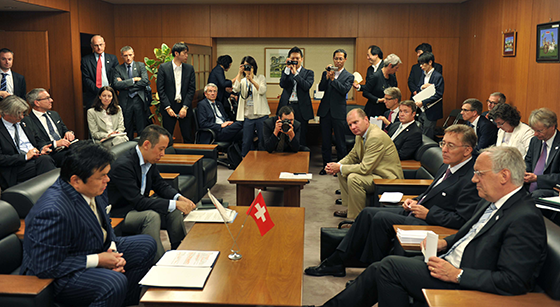
Federal Councillor Schneider-Ammann led an official mission to Japan last July as part of the jubilee celebrating 150 years of diplomatic relations between the two countries. It was also an opportunity to show Switzerland’s support for regions ravaged by the tsunami in 2011.
After two violent external shocks - the financial crisis and the 2011 disasters (earthquake, tsunami and nuclear accident) - the Japanese economy is now out of recession. Structural problems remain complex nonetheless, not least in relation to demography, public debt and deflation. Prime Minister Abe based his recovery programme on three pillars: extensive monetary policy, flexible fiscal policy and a new growth policy. These measures stimulated consumption and led to a rise in GDP, which topped 6% in the first quarter of 2014. Growth has since fallen back however. It appears that the weak yen is no longer actually stimulating exports, at least in volume terms, and is making imports more expensive, with a resultant impact on public finances. In addition, the rate of VAT was increased on 1st April this year by 3% and now stands at 8%.
The balance of trade between Switzerland and Japan is largely in the former’s favour. In 2013, among Switzerland’s main industries, only watchmaking saw its exports to Japan increase, and a general decline in exports and imports between the two countries was observed. The free trade agreement appears to be having little positive effect and this point was raised during discussions.
Japan has thus been an important market for the Swiss watch industry for a very long time. The ambassador mandated 150 years ago by the Federal Council to establish diplomatic relations with Japan, Aimé Humbert-Droz, was the son of a watchmaker. Since then, Swiss timepieces have been ever-present on the Archipelago, today more than ever.
In 2013, Swiss watch exports to Japan - the industry’s seventh largest market - climbed to 1.155 billion francs. After the first six months of 2014 Japan edged into third place, ahead of China, while the value of exports totalled 658 million, an increase of 25.5% compared to 2013. Watches are Switzerland’s second largest export to Japan, behind pharmaceutical products and ahead of chemicals and machines.
It was in this context that the official Swiss mission took place. Discussions, particularly with Deputy Minister Kazuyoshi Akaba (Ministry of Economy, Trade and Industry) and Minister Akira Amari (Minister in charge of Economic Revitalization, Total Reform of Social Security and Tax), focused on bilateral relations, which incidentally are excellent. The point was made that the Switzerland-Japan free trade agreement was the first of its kind to be signed by Japan with a European country. It would appear that Japan wishes to continue along these free trade lines with its Asian neighbours.
Demographic questions also featured prominently in discussions. The decline in the birth rate and the absence of immigration are major challenges for a country whose population is in decline.
The delegation visited the Onagawa-Fukushima region to witness reconstruction efforts in the wake of the 2011 catastrophe and to demonstrate Switzerland’s support for the country following this terrible calamity. Our country has made a significant contribution to reconstruction of the Onagawa medical centre. The Swiss delegation was impressed by the courage and determination of local populations to rebuild not only the region’s infrastructures, but also its image. The official Swiss visit was greatly appreciated and helped to consolidate links between the two countries.
August 15, 2014


 News
News